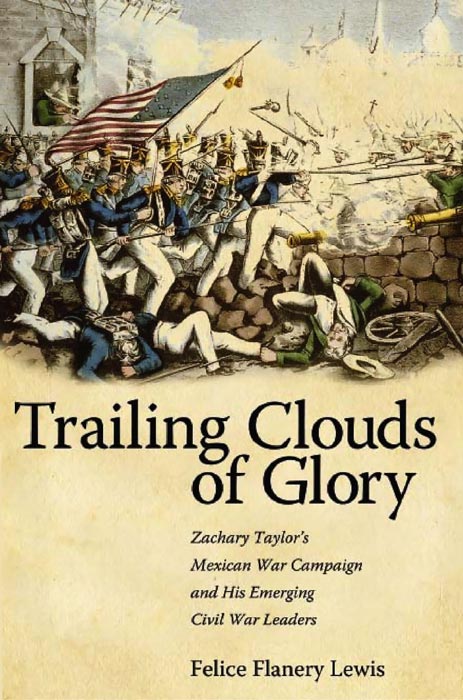 Trailing Clouds of Glory Trailing Clouds of Glory
Zachary Taylor's Mexican War Campaign and His Emerging Civil War Leaders
Felice Flanery Lewis
Narrated by Kirk O. Winkler
Available from Audible
Book published by The University of Alabama Press
This work is a narrative of Zachary Taylor’s Mexican War campaign, from the formation of his army in 1844 to his last battle at Buena Vista in 1847, with emphasis on the 163 men in his “Army of Occupation” who became Confederate or Union generals in the Civil War. It clarifies what being a Mexican War veteran meant in their cases, how they interacted with one another, how they performed their various duties, and how they reacted under fire. Referring to developments in Washington, D.C., and other theaters of the war, this book provides a comprehensive picture of the early years of the conflict based on army records and the letters and diaries of the participants.
Trailing Clouds of Glory is the first examination of the roles played in the Mexican War by the large number of men who served with Taylor and who would be prominent in the next war, both as volunteer and regular army officers, and it provides fresh information, even on such subjects as Robert E. Lee and Ulysses S. Grant. Particularly interesting for the student of the Civil War are largely unknown aspects of the Mexican War service of Daniel Harvey Hill, Braxton Bragg, and Thomas W. Sherman.
Felice Flanery Lewis was Dean of Conolly College of Liberal Arts and Science at the Brooklyn Center of Long Island University and practiced law in New York State before her retirement in 2001. She is author of Literature, Obscenity, and Law and coeditor, with Elmer Gertz, of Henry Miller: Years of Trial and Triumph, 1962–1964, The Correspondence of Henry Miller and Elmer Gertz.
REVIEWS:
“Trailing Clouds of Glory is an essential addition to any Mexican War library because of its focus on Taylor. It is also a useful addition to the growing effort to move beyond generalizations and determine the specifics of the influence Mexico had on Civil War leadership”
—Civil War Book Review “This study of Zachary Taylor’s campaign in northern Mexico makes a significant contribution to the history of this often forgotten war. The work reads well, is organized logically, is argued effectively, and is rooted in extensive primary research.”
—Timothy D. Johnson, author of Winfield Scott: The Quest for Military Glory and A Gallant Little Army: The Mexico City Campaign “Readers who enjoy a more traditional approach ... will delight in Lewis's volume. By design, the narrative emphasizes regulars and officers. She details the dated arrival and departure of various companies and regiments, along with the deployment, command, retirement, injury, and death among officers ranked from general to lieutenant. Her research is most impressive, the footnotes rich in primary sources, congressional and War Department documents, but especially the personal papers and diaries of the participants. She is also aware of and engaged with current scholarship, a point reflected in her extensive bibliography and throughout the volume where she parries thrusts against the military reputation of Old Zach.”
—H-Net Reviews “Students of both wars will find much of value and interest in Trailing Clouds of Glory. No other book attempts on this scale such a precise accounting of the presence of Civil War officers on the battlefields and dusty trails of northern Mexico in the period between the establishment of Fort Brown and the American victory at Buena Vista.”
—Civil Wary Books and Authors “Felice Flanery Lewis has two goals in this impressively researched and tightly written study: to provide a narrative history of Zachary Taylor’s campaigns in Texas and northern Mexico in the early stages of the U.S.-Mexican War and to analyze the collective experiences of junior and mid-level officers in his army who would become generals in the Civil War.... Drawing on a wide range of published and manuscript sources, she develops a detailed, almost day-by-day account of Taylor’s army.... The tone of the study is triumphalist, highlighting the courage and competence of the regular army officer corps and especially the performance of Taylor himself, whose generalship the author believes to be underrated.”
—Journal of Southern History
|

